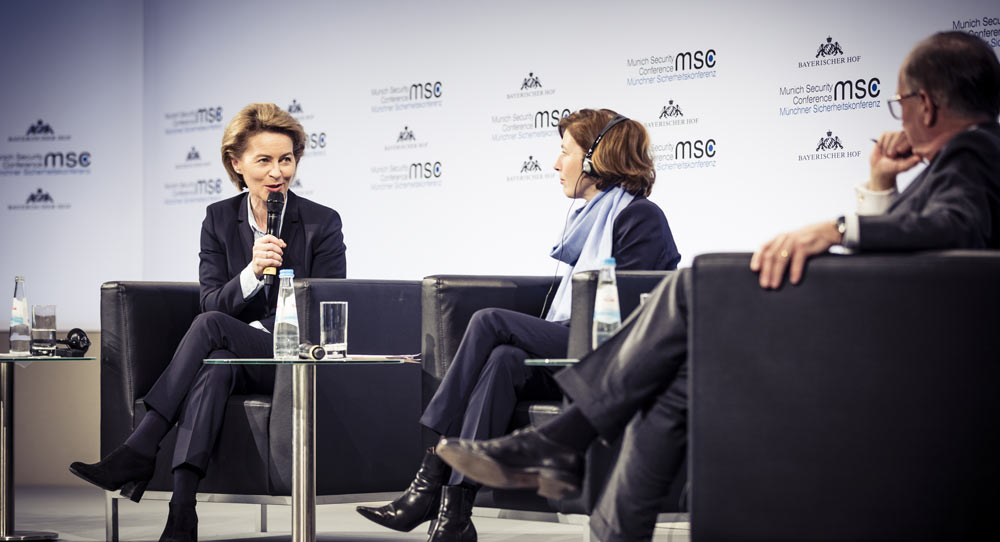Carnegie Europe was on the ground at the 2018 Munich Security Conference, offering readers exclusive access to the debates as they unfold and providing insights on today’s most consequential threats to international peace.
*
It’s always fascinating to hear a German defense minister and a French defense minister take the floor at the annual Munich Security Conference, which kicked off today.
Despite all the talk about how close they are—what with all the ministerial and parliamentary meetings, youth exchanges, endless number of dialogues, and the degree of trust that these two most important European countries have built since 1945—they are in fact very far apart in outlook.
Nowhere is that more obvious than when it comes to security and defense issues—with implications for European defense.
The differences between Paris and Berlin were already pretty clear two years ago at the MSC. Ursula von der Leyen, the German defense minister, homed in on the refugee and migration crisis as one of the major challenges facing Europe. Her French counterpart at the time, Jean-Yves Le Drian, made terrorism the number one issue. There was no meeting of minds when it came to sharing a common threat perception.
Two years down the road, if you think that von der Leyen and the new French defense minister, Florence Parly, have moved closer on how their countries are going to push Europe to think—and act—strategically, don’t hold your breath.
On the opening day of this year’s MSC, both ministers again gave completely different views about how to make Europe “defense ready.” They both praised that awful EU acronym, PESCO. But heaven knows how long that’s going to take to get off the ground, let alone how all the bloc members are going to agree what projects they should jointly embark upon.
That aside, von der Leyen, for her part, didn’t shy away from making the odd snipe at the United States. “We have been taking action together with our transatlantic partners. We want to remain transatlantic but we want to become more European,” she told the packed ballroom of predominantly male participants.
And without needing to name names, she said that “some of our partners continue to roll back spending on diplomacy, development aid, and the United Nations.” Later, in a not-so-thinly disguised critique of the short attention span of or the lack of long-term planning in U.S. foreign and military policy, she asked what use was it to a citizen of Mosul to be liberated from ISIS only to starve to death?
All well and good. For von der Leyen, there is a need to focus not only on defense but also on development. For Berlin, the two go hand in hand. Maybe she is right.
But the implication of von der Leyen’s comments was that if Germany spent more on development aid (and used it more wisely, which she didn’t mention), Berlin just might be let off the hook for not increasing its defense spending to 2 percent of its GDP—the well-known NATO goal.
In addition, whenever the new German government is sworn in, there will be a big rollback on arms exports to certain countries. That’s understandable. But Berlin is surely not naive enough to believe that those countries will simply not shop elsewhere for their weapons.
When it came to the French view of defense, Parly couldn’t have been more different. She was pushing the aspirations of her boss, President Emmanuel Macron.
“We left Europe to the bureaucrats, to the tyranny of consensus... it’s time to give it its magic back,” she said. No messing there. Parly also had no illusions about PESCO’s potential. “It’s in its infancy. We have major steps ahead. Europeans have understood they must take joint action against terrorism,” she added, reiterating the importance of the threat for France.
France, however, is not going to sit and wait for PESCO to get off the ground. Macron has already unveiled his own European Defense Initiative. Those who want to join can: “Those who wish to and are capable,” Parly added. “We must not accept the strait jackets that still exist.”
The message was clear: European defense cannot be held hostage by a few countries or by EU bureaucracy. “The success of European defense does not depend on the institutions… it will come from new missions and operations,” Parly said. And just to show that France was not aiming to be the new Gaullist defense leader of Europe—though Poland and some other countries might think otherwise—Parly reminded her audience that Macron had committed to spend 2 percent of GDP on defense by 2025. “It’s a huge financial effort,” she said. It’s also about a French awareness of the need to protect its citizens and its interests.
Fundamentally, it’s about a France that, unlike Germany, is unwilling to be tied to institutions.
“Democracy, the bastion of our liberties, became the target of subversion. The power centers are moving in a direction that is not the direction of liberal democracies,” she said. “We, the old robust Europeans, have to take a serious look at ourselves.” And then what?


.png)


-1.png)

-1.png)
